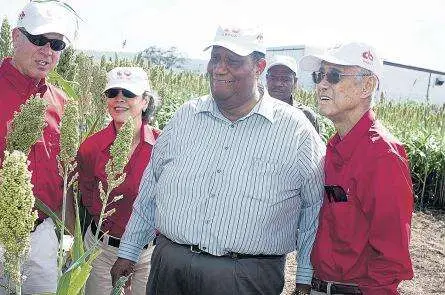
2014 might be a bumper year for agriculture
THE agriculture sector likely contracted last year.
Having declined by 4.9 per cent during the first nine months of 2013, it would have had to register over 16 per cent growth in the last quarter to edge out 2012.
On the other hand, momentum has been building over the past 12 months.
After registering an 11.6 per cent decline in real value added during the first three months of 2013, according to the Planning Institute of Jamaica, contraction in the second quarter was much lower at 6.6 per cent, while the third quarter saw five per cent growth.
“If you look at it, the first two quarters of 2013 were poor due to the lingering effects of Hurricane Sandy. And since that recovery, we have seen significant growth,” said president of the Jamaica Agricultural Society (JAS), Senator Norman Grant.
Recovery aside, four more agro parks covering 1,800 acres of land are slated to start operations by March 2014, on top of the three currently in operation, although at least one of them has hit a major snag — mismanagment by the Agro Invest Corporation (AIC) has resulted in the loss of a projected $50 million worth of onions at the Plantain Garden River (PGR) Agro-Park in St Thomas. (See report in Daily Observer, Monday, January 6, 2014.)
The agriculture ministry has promised to provide the farmers with $7.5 million in support to help them get back on their feet, while the type of crop grown is expected to be changed to pumpkin or pepper.
Grant said that Irish potato and red peas are also being targeted in other large-scale agricultural projects.
The agricultural sector can also benefit from supplying food, such as black bean and rice, to Venezuela under the oil-for-loans PetroCaribe deal, which allows the Government to service the debt through the supply of goods.
Private sector entities have indicated expansion in cultivation of crops to be used in the production.
Jamaica Broilers plans to start the cultivation of a next corn crop — to make animal feed within the next three months, on 100 acres, said Christopher Levy, president and chief executive officer of Jamaica Broilers Group.
Levy said Jamaica Broilers is leaning towards the model of contracting farmers to plant the crop, but won’t do so until the company gets it right.
Meanwhile, Caribbean Broilers Group, plans to double its sorghum yield this year.
Having learnt from the pitfalls last year, the yields should be greater this year, said Dr Keith Amiel, corporate affairs manager.
“We did about 60 tonnes per acre and we want to push it up to 120 tonnes,” he told the Business Observer.
Red Stripe, yesterday signed a lease agreement with the Agro Investment Corporation (AIC) of Jamaica for a plot of land at Bernard Lodge that the beer maker says will serve as the launch of its pilot farm and factory in a project aimed at replacing the majority of imported inputs with local produce.
The company aims to begin to produce cassava beer in September from the pilot.
Stakeholders say 2013, for the most part, was good to them.
The JAS head said the industry was self-sufficient with table eggs, and there was growth in Irish potato and ginger.
“Last year, we had the largest production of ginger in 25 years, with 1.4 million kilogrammes grown,” Grant said.
“2013 wasn’t a bad year for us, as it relates to poultry. We started the year with high corn prices and the devaluation of the Jamaican dollar has been a concern,” said Levy. “We are cautiously optimistic about 2014.”
But the president of the Pig Farmers’ Association of Jamaica Delroy Manya said last year wasn’t good for the pig sector. Chief among the issues was tighter disposable income among consumers.
“We saw a reduction in price for the product, the cost of feed consistently increased, and the sliding dollar brought hike in the price of grain,” he said. “There was an overproduction of some sort.”
Overall, the cost of product went up and the sector was getting less for the product, Manya added.
Some small farmers had fallen out of the industry, but the bigger players managed to increase production so it didn’t affect the sector’s supply, he said.
In an effort to fix the problems for 2014, Manya said the association is examining how it can help to structure the industry as it relates to production.
The number one deterrent to the industry, praedial larceny, which, was estimated to have cost the sector about $5 billion, will be aggressively combated this year.
“We are going to give praedial larceny hell this year, through the Farmerhood Watch, where farmers in communities keep watch over each other’s farms,” he said.
Grant expects that the Secured Interest in Personal Property (SIPP) Bill, which was passed in Parliament last year, will fuel further growth in the agricultural sector, through increased access to financing.
The Bill, which is a requirement under the four-year Extended Fund Facility with the International Monetary Fund, allows for crops to be used as collateral to secure loans.
“Now that it’s (SIPP) in place, it needs to be operationalised so that farmers can increase their production,” he said.
Specifically, the JAS head figures that there will be growth in domestic agriculture based on initiatives in the pipeline.























